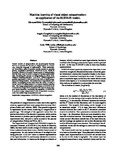Machine learning of visual object categorization: an application of the SUSTAIN model
| dc.contributor.author | Carmantini, GS | |
| dc.contributor.author | Cangelosi, A | |
| dc.contributor.author | Wills, Andy | |
| dc.date.accessioned | 2014-08-12T08:33:56Z | |
| dc.date.accessioned | 2014-08-12T08:34:25Z | |
| dc.date.available | 2014-08-12T08:33:56Z | |
| dc.date.available | 2014-08-12T08:34:25Z | |
| dc.date.issued | 2014-08-12 | |
| dc.identifier.isbn | 9780991196708 | |
| dc.identifier.uri | http://hdl.handle.net/10026.1/3070 | |
| dc.description.abstract |
Formal models of categorization are psychological theories that try to describe the process of categorization in a lawful way, using the language of mathematics. Their mathematical formulation makes it possible for the models to generate precise, quantitative predictions. SUSTAIN (Love, Medin & Gureckis, 2004) is a powerful formal model of categorization that has been used to model a range of human experimental data, describing the process of categorization in terms of an adaptive clustering principle. Love et al. (2004) suggested a possible application of the model in the field of object recognition and categorization. The present study explores this possibility, investigating at the same time the utility of using a formal model of categorization in a typical machine learning task. The image categorization performance of SUSTAIN on a well-known image set is compared with that of a linear Support Vector Machine, confirming the capability of SUSTAIN to perform image categorization with a reasonable accuracy, even if at a rather high computational cost. | |
| dc.format.extent | 290-295 | |
| dc.language.iso | en | |
| dc.publisher | Cognitive Science Society | |
| dc.relation.replaces | http://hdl.handle.net/10026.1/3069 | |
| dc.relation.replaces | 10026.1/3069 | |
| dc.title | Machine learning of visual object categorization: an application of the SUSTAIN model | |
| dc.type | conference | |
| dc.type | Conference Proceeding | |
| plymouth.publication-status | Published | |
| plymouth.journal | Proceedings of the 36th Annual Conference of the Cognitive Science Society | |
| plymouth.organisational-group | /Plymouth | |
| plymouth.organisational-group | /Plymouth/Admin Group - REF | |
| plymouth.organisational-group | /Plymouth/Admin Group - REF/REF Admin Group - FoH | |
| plymouth.organisational-group | /Plymouth/Faculty of Health | |
| plymouth.organisational-group | /Plymouth/REF 2021 Researchers by UoA | |
| plymouth.organisational-group | /Plymouth/REF 2021 Researchers by UoA/UoA04 Psychology, Psychiatry and Neuroscience | |
| plymouth.organisational-group | /Plymouth/Research Groups | |
| plymouth.organisational-group | /Plymouth/Research Groups/Institute of Health and Community | |
| plymouth.organisational-group | /Plymouth/Users by role | |
| plymouth.organisational-group | /Plymouth/Users by role/Academics | |
| dc.publisher.place | Austin, TX | |
| dc.rights.embargoperiod | Not known | |
| rioxxterms.licenseref.uri | http://www.rioxx.net/licenses/all-rights-reserved | |
| rioxxterms.type | Conference Paper/Proceeding/Abstract |


